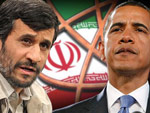 New York Times : Bad news: the Obama administration and the West hold a lousy hand as they go into talks with Iran. New York Times
New York Times : Bad news: the Obama administration and the West hold a lousy hand as they go into talks with Iran. New York Times
By JOHN VINOCUR
 PARIS — Bad news: the Obama administration and the West hold a lousy hand as they go into talks with Iran.
PARIS — Bad news: the Obama administration and the West hold a lousy hand as they go into talks with Iran.
Related in News
In a world of dreams and miracles, the conversations, starting Saturday, would end with the mullahs renouncing their drive toward nuclear weapons, and the disappearance of a thunderhead of foreboding and grief.
Reality says otherwise, three ways.
It demonstrates that the Iranians are emboldened by the West’s backing off in Syria. It acknowledges that some of the allies have serious concerns about Barack Obama’s willingness to make concessions and stretch out the talks, playing for time, Iranian-style, until after the U.S. presidential election. And it imposes the conclusion that there is no visible way these so-called confidence building exchanges (don’t call them negotiations) can produce confidence solid enough for the United States, Britain, France and Germany to believe that Iran is willing to cast aside the nuclear military program they accuse it of running.
Backed by Russia and China, Tehran has little reason to offer more than a reformulation of its standard maze of denials and ambiguities in response to the West’s weak diplomatic cards.
As little as a month ago, the Obama administration was talking about the imminent departure of Bashar al-Assad, Syria’s leader. His ouster would have been a vast blow to Iran, which regards Assad as its closest ally and buffer.
But the West buckled in the face of Russian and Chinese resistance, withdrawing its U.N. Security Council draft resolution that demanded that Assad leave and that Russia halt its supply of arms to Syria. No substantive Western action followed. Assad remains. This is a terrible precedent.
Last week, I asked Gérard Longuet, the French defense minister, how he now would describe the circumstances in Syria. His frankness was startling: “Iran has won the round and Russia was its accomplice.”
Result: an emboldened Iran. Indeed, a Tehran parliamentarian said over the weekend that Iran can now produce 90-plus enriched uranium and thus, in theory, a nuclear weapon.
That’s both a test and a taunt. It’s also a way of saying (and provoking dissension among the allies) that the West is already tolerating a nuclear-capable Iran — that is, one that hasn’t assembled a weapon but holds the necessary technology and components in hand, just like Japan.
At the same time, the Obama administration has left its European counterparts with a virtual certainty: that it wants the talks to extend until Election Day, Nov. 4. This is based on the flimsy premise that Israel will be reluctant to strike Iran as long as the talks continue.
Yet the administration’s approach to the conversations does not include a clear exit strategy, which intensifies the likelihood of their dawdling futility.
The French, in this context, are describing themselves as “guardians of the temple,” meaning that they have suspicions of U.S. concessions that would bend or skirt the Security Council’s requirements for the mullahs to prove their total disengagement from pursuing nukes. (Think, in the worst case, of a triangular deal with Russia and Iran reflecting Mr. Obama’s on-mike appeal to Vladimir Putin for “space” in exchange for “flexibility” on missile defense.)
Indeed, France is opposed to an Israeli strike. But when it comes to exerting pressure, Mr. Longuet, seemingly addressing the administration, said, “The real problem in the Middle East is Iran not Israel.”
Did he fear a major international conflict — as administration officials warn — in the event of a strike? “International, no,” he answered.
Nowhere — really nowhere — is there optimism the talks will succeed.
So what to do?
Mr. Obama should make clear that further sanctions on Iran, with the addition of prohibitions involving Europe’s oil trade beginning July 1, will intensify short of conclusive, verifiable steps by Iran to halt its drive for nukes.
He could well try buying himself more “space” — and get past the election in the process — by trying to bring together American and Israeli timelines on when Iran’s drive becomes irreversible. In an article, often referred to as authoritative, in late January, the Israeli journalist Ronen Bergman said that Israel believed that it had nine months in which to act before Iranian targets entered an “ immunity zone,” while it considered that the United States, with its wider capabilities, had 15.
There are no guarantees Israel would lengthen its notational time frame to 15 months, but Washington could try by providing it with additional refueling aircraft and 200 GBU-31 bunker busters.
Doing so with time left on the clock for some unmistakable compliance from Tehran would at the same time draw a red line defining for the mullahs what the president meant when he said the U.S. would always “have Israel’s back.”
His default position if, as is likely, the clock runs out?
Mr. Obama, as well as Iran, is stuck with his having said in an election year that he finds it “entirely appropriate” that “Israel’s leaders will make determinations based on what they believe is best for the security of Israel.”


